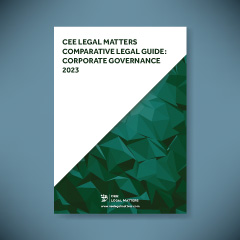Contributed by MPR Partners.
1. Corporate Structure Of The Companies
1.1. General Legal Framework
The corporate bodies that Romanian must have in place depend on their specific legal form, as detailed below.
Our answers will focus on limited liability companies (LLCs) and joint-stock companies (JSCs), as they same represent the vast majority of Romanian companies (out of a total of approximately 1.1 million active Romanian companies, almost all are LLCs, with the number of Romanian JSCs being around 10,000).
Limited liability companies
Romanian LLCs must have at least one director (administrator).
There are no differences as regards the corporate bodies an LLC must have in place depending on whether the same is a small, medium, or large company.
Joint stock companies
Romanian JSCs may implement either one-tier management or two-tier management, as detailed below.
One-tier management
The one-tier management implies appointing at least one director. If more than one director is appointed, the number of directors must be uneven and the appointed directors will form a Board of Directors (Consiliu de Administratie) and the Board of Directors/shareholders will need to appoint one of the Board members as Chairman of the Board of Directors.
JSCs subject to statutory financial statements audit are obliged to appoint at least three directors to form a Board of Directors. In such a scenario, it is also mandatory for the Board of Directors to delegate the management of the JSC to one or more managers (directori), one of the same being appointed as general manager (director general).
A JSC is subject to statutory financial statements audit if they meet at least two of the following three criteria:
(i) the JSC’s total assets exceed a value of RON 16 million (approximately EUR 3.2 million);
(ii) the JSC’s net annual turnover exceeds a value of RON 32 million (approximately EUR 6.4 million);
(iii) the JSC’s average number of employees during the financial year exceeds 50.
Therefore, the management system of a one-tier management JSC differs based on meeting at least two of the three criteria above. It thus does not depend on whether it is a small, medium, or large company.
We also mention that JSCs that are not subject to the statutory financial statement can also appoint a Board of Directors that delegates the management to one or more managers.
Two-tier management
Romanian JSCs may choose to implement a two-tier management system.
The two-tier management system implies the following corporate bodies:
(i) a directorate (Executive Board) that ensures the management of the JSC; and
(ii) a Supervisory Board, which supervises the management undertaken by the Executive Board.
The members of the Executive Board are appointed by the Supervisory Board, which also appoints one of the members of the Executive Board as the Chairman thereof.
The members of the Executive Board cannot also hold the capacity of members of the Supervisory Board and vice versa.
Romanian LLCs may have a sole shareholder and a maximum of 50 shareholders.
Romanian JSCs must have at least two shareholders.
Regardless of the legal form, an individual and/or legal entity cannot hold the shareholder capacity in a Romanian company if:
(i) they have been denied by a final court decision the right to hold a such position as a punishment complementary to the conviction for crimes against a property by disregarding trust, corruption, embezzlement, forgery in documents, tax evasion, offenses provided by legislation for the prevention and sanctioning of money laundering, as well as for the establishment of measures to prevent and combat the financing of terrorism or for the offenses provided by the Romanian Companies Law no. 31/1990;
(ii) they have committed deeds that are subject to registration in the fiscal record.
In LLCs and JSCs, shareholders are usually liable up to the value of the company’s share capital.
Nevertheless, there are certain legal provisions that regulate and expand the liability of shareholders, as follows:
(i) creditors or other persons adversely affected by the Shareholders’ Assembly decision pertaining to the amendment of the articles of association of a Romanian company may lodge a complaint before the competent court to order the company or, as the case may be, the shareholders to cover the damages;
(ii) companies may also lodge complaints against their shareholders for damages caused thereto;
(iii) shareholders which have concluded legal acts/deeds with third parties on behalf of a company under the incorporation procedure are liable for the same towards the third parties unless the legal acts/deeds are taken over by the company after its incorporation;
(iv) shareholders which, in fraud of creditors, abuse the limited nature of their liability and the separate legal personality of the company, become liable without limitation as regards the unpaid obligations of a dissolved/liquidated company, in particular when such shareholders use the company’s assets as their own or diminish the company’s assets for their personal benefit or for the benefit of third parties while knowing or ought to know that the company will thus be unable to meet its obligations.
There are also various criminal offenses a shareholder may be liable for (and thus face a criminal fine or imprisonment of up to five years, depending on the actual criminal offense committed), such as:
(i) presenting, in bad faith, in the prospectuses, reports, and communications addressed to the public, false data as regards the incorporation of the company or as regards its economic or legal condition or hiding, in bad faith, such data;
(ii) acquiring, on behalf of the company, shares of other companies, at a price that the shareholder knows to be obviously higher than the actual value of the shares, or, selling, on behalf of the company, shares that the same holds, at a price that the shareholder knows to be obviously lower than the actual value of the shares;
(iii) using, in bad faith, the goods or the credit the company enjoys, for a purpose contrary to the interests of the company or for their own benefit or in favor of another company in which they have direct or indirect interests;
(iv) spreading fake news or using other fraudulent means which have the effect of increasing or decreasing the value of the shares or bonds of the company or of other securities belonging to it, for the purpose of obtaining, for themselves or for other persons, a benefit, causing damages to the company; this applies strictly to JSCs; practice shows that this could be applied in connection to LLCs as well when fake news refers to the values held by the LLC in another company;
(v) receiving or paying dividends, in any form, from fictitious profits or which could not be distributed during the financial year based on the interim and annual financial statements (i.e., the company has no profits according to the same) or contrary to the results from the financial statements;
(vi) passing their shares or debentures into the name of another person for the purpose of forming a majority in the Shareholders’ Assembly, to the detriment of other shareholders or debenture holders;
(vii) voting in Shareholders’ Assemblies, in the situation referred to in point (vi) above, as the owner of shares or debentures which do not actually belong to him/her/it;
(viii) when, in exchange for an undue material benefit, he/she/it obliges itself to vote in a certain way in the Shareholders’ Assembly or to not take part in the vote;
(ix) when involved in a fictitious transfer of shares in a company for the purpose of committing a criminal offense or evading or hindering criminal prosecution.
Romanian companies are split into the following categories:
(i) micro-entities;
(ii) small entities;
(iii) medium and large entities (the same being grouped into the same category).
Micro-entities are entities that, at the date of the financial statements, do not exceed at least two of the following three criteria:
(i) value of the total assets – RON 1.5 million (approximately EUR 338,000);
(ii) value of the net turnover – RON 3 million (approximately EUR 676,500); and
(iii) the average number of employees during the financial year – 10.
Small entities are entities that do not fall under the micro-entities category and, at the date of the financial statements, do not exceed at least two of the following three criteria:
(i) value of the total assets – RON 17.5 million (approximately EUR 3.95 million);
(ii) value of the net turnover – RON 35 million (approximately EUR 7.9 million);
(iii) the average number of employees during the financial year – 50.
Medium and large entities are entities that, at the date of the financial statements, exceed at least two of the following three criteria:
(i) value of the total assets – RON 17.5 million (approximately EUR 3.95 million);
(ii) value of the net turnover – RON 35 million (approximately EUR 7.9 million);
(iii) the average number of employees during the financial year – 50.
1.2. The Function of the Supervisory Board
The main function of the Supervisory Board of a two-tier managed Romanian JSC is to supervise the management of the company by the Executive Board.
Its attributions are as follows:
(i) to appoint and dismiss the members of the Executive Board;
(ii) to represent the company in its relationship with the Executive Board;
(iii) to request from the Executive Board any information it deems necessary to exercise its control and supervision duties and to undertake appropriate checks and investigations;
(iv) to verify the compliance of the management of the company with the law, articles of association, and Shareholders’ Assembly decisions;
(v) to report to the Shareholders’ Assembly as regards its supervisory activity, at least once per year;
(vi) in extraordinary circumstances, when the company’s interests require it, to convene the Shareholders’ Assembly.
The Romanian Companies Law does not contain specific provisions requiring guarantees from the Supervisory Board for ensuring its competencies in terms of long-term viability, strategical direction, and best interests of the company, as, in the end, the role of the Supervisory Board is to supervise the management of the company, not to undertake the same.
Nevertheless, members of the Supervisory Board must hold professional liability insurance.
There are also additional measures prescribed by the Romanian Companies Law aimed at preventing conflicts of interest, as follows:
(i) members of the Supervisory Board cannot be members of the Executive Board;
(ii) members of the Supervisory Board cannot be employees of the company.
Moreover, specific professional and independence-related conditions that must be met by the members of the Supervisory Board may be established in the company’s articles of association or via a decision of the Shareholders’ Assembly. As regards the criteria by which a member of the Supervisory Board is considered independent, the same is prescribed by the Romanian Companies Law (though not directly but by reference to independence criteria applicable to non-executive Board members), out of which we mention the following:
(i) to not have held the director/Executive Board member of the company or of another company controlled by the company within the last five years;
(ii) to not have been an employee of the company or of another company controlled by the company within the last five years;
(iii) to not have received remuneration or other advantages from the company or from another company controlled by the company within the last five years, with the exception of those granted for holding the capacity of a member of the Supervisory Board;
(iv) to not be a significant shareholder of the company;
(v) to not have or have had within the last year business relations with the company or with another company controlled by the same either directly or as a result of his/her position in another company having business relations with the company or with another company controlled by the same;
(vi) to not hold or have held the financial auditor capacity in the company or in another company controlled by the same within the last three years.
While not expressly regulated under the Romanian Companies Law, this can be regulated under the articles of association of the company and/or in the agreement to be concluded between the company and the members of the Supervisory Board.
In addition, the Romanian Companies Law contains a series of provisions that indirectly should determine Board members to perform their duties in the best interests of the company, some of which are detailed below.
A limitation imposed by the Romanian Companies Law that may aid in the Board members properly dealing with their duties is the fact that an individual may only hold the capacity of a member of a Supervisory Board in a maximum of five companies at the same time (such restriction not applying when the individual holds at least one-quarter of the shares of such company).
Moreover, the same restrictions applicable to shareholders detailed above also apply to members of the Supervisory Board.
Last but not least, members of the Supervisory Board can be held liable in court for damages caused to the company and may also be held liable for various criminal offenses, such as:
(i) presenting, in bad faith, in the prospectuses, reports, and communications addressed to the public, false data as regards the incorporation of the company or as regards its economic or legal condition or hiding, in bad faith, such data;
(ii) presenting, in bad faith, to the shareholder(s), an inaccurate financial situation of the company or a financial situation containing inaccurate data regarding the company’s financial or legal condition, in order to hide the real situation of the company from the shareholder(s);
(iii) refusing to provide appointed experts with information necessary for the same to conduct the evaluation of goods to be included in the share capital/share capital increase of the company or preventing such experts, in bad faith, from undertaking their obligations as regards such evaluation;
(iv) spreading fake news or using other fraudulent means which have the effect of increasing or decreasing the value of the shares or bonds of the company or of other securities belonging to it, for the purpose of obtaining, for themselves or for other persons, a benefit, causing damages to the company;
(v) using, in bad faith, the goods or the credit the company enjoys, for a purpose contrary to the interests of the company or for their own benefit or in favor of another company in which they have direct or indirect interests.
1.3. The Function of the Executive Board
The main function of the Executive Board is to ensure the management of two-tier managed Romanian JSCs.
The duties of the Executive Board are not detailed by the Romanian Companies Law, which simply provides that the Executive Board undertakes all deeds necessary and useful for the fulfillment of the company’s business object, except those reserved by law for the Supervisory Board and for the Shareholders’ Assembly.
As with shareholders and members of the Supervisory Board, one cannot hold the capacity of a member of the Executive Board if:
(i) he/she (only individuals may hold the capacity of a member of the Executive Board) has been denied by a final court decision the right to hold such a position as a punishment complementary to the conviction for crimes against property by disregarding trust, corruption, embezzlement, forgery in documents, tax evasion, offenses provided by legislation for the prevention and sanctioning of money laundering, as well as for the establishment of measures to prevent and combat the financing of terrorism or for the offenses provided by the Romanian Companies Law no. 31/1990;
(ii) they have committed deeds that are subject to registration in the fiscal record.
The obligations detailed above as regards the members of the Supervisory Board as regards holding a professional liability insurance and a limited number of five mandates that may be held at the same time also apply to members of the Executive Board.
As with members of the Supervisory Board, members of the Executive Board cannot be employees of the company.
Moreover, members of the Executive Board cannot hold the capacity of manager, director, Executive Board member, Supervisory Board member, censor, internal auditor, or shareholder with unlimited liability in competing companies or those having the same business object, nor can they undertake in their own name or on behalf of other parties the same type of business or a competing business to that of the company where they hold the Executive Board member capacity without the prior approval of the Supervisory Board.
1.4. Conflicts of Interest and Related Party Transactions
From a corporate perspective, there are certain provisions of the Romanian Companies Law that aim to prevent conflicts of interest, as follows:
- shareholders that, as regards a specific operation have, either in their own names or on behalf of third parties, interests that are contrary to those of the company cannot take part in the deliberations/decision-making on said specific operation;
- directors/members of the Board of Directors that, as regards a specific operation have, directly or indirectly, interests that are contrary to those of the company must inform the other directors/Board members, censors, and internal auditors of the company as regards said contrary interests and must abstain from participating to any deliberation on said specific operation; such obligation applies also in relation to operations where the spouse or relatives up to the fourth degree of the director/Board member have interests contrary to that of the company;
- companies are prohibited to credit directors/Board of Directors members/Executive Board members/Supervisory Board members through operations such as: (i) lending money; (ii) granting financial advantages in relation to or following operations by which the same supply goods/services/works to the company; (iii) directly or indirectly securing loans/credits accessed by the same; (iv) directly or indirectly securing the execution of personal obligations thereof towards third parties; (v) the acquisition for consideration or payment, in whole or in part, of a claim relating to a loan granted by a third party to the same. Such restrictions also apply to spouses and relatives up to the fourth degree of directors/Board of Directors members/Executive Board members/Supervisory Board members.
As regards related party transactions, the same is not prohibited under Romanian law.
However, there are certain requirements for related party transactions imposed by the Romanian Tax Code, as follows:
(i) the same must be undertaken on an arm’s length principle;
(ii) the price of such transactions must be set on market value for similar transactions between non-related parties;
(iii) each member of a group must compile the transfer pricing file which must reflect transactions concluded both with members of the same fiscal group and with affiliates outside the fiscal group.
1.5. Legal Framework for Large Companies
Medium and large companies are not required to have other mandatory corporate bodies other than those detailed in Section 1.1., this also applies to listed companies and financial institutions.
Nevertheless, depending on the business object of the company, additional conditions may apply to the individuals holding management positions, for example:
(i) companies providing medical services are required to have a director that is a medical professional;
(ii) financial institutions need to register their management members with the National Bank in Romania and for this purpose the same need to provide documentation reflecting the good reputation and relevant experience of such members;
(iii) conditions similar to those mentioned in point (ii) above are also applicable to executive managers of insurance companies.
2. Corporate Governance Framework
2.1. Transparency and Public Disclosures
Public enterprises (i.e. regies autonomes incorporated by the Romanian state or by territorial and administrative divisions, companies where the Romanian state or territorial and administrative divisions are sole shareholders, a majority shareholder or where the same exercise control and companies held by other companies where the Romanian state or territorial and administrative divisions are sole shareholders, majority shareholder or where the same exercise control) are subject to mandatory corporate governance rules that require them to publish the following documents on their websites:
(i) the convening notice of the Shareholders’ Assembly, at least 30 days prior to the Assembly;
(ii) the Shareholders’ Assembly decisions, within 48 hours of the date of the Assembly;
(iii) the annual financial statements, within 48 hours of their approval;
(iv) the half-yearly accounting reports, within 45 days of the end of the half-year;
(v) the annual audit report;
(vi) the list of directors and managers, the CVs of the members of the Board of Directors and of the managers or, as the case may be, the CVs of the members of the Executive Board and of the Supervisory Board and the remuneration level thereof;
(vii) the reports of the Board of Directors or of the Supervisory Board, as the case may be;
(viii) the annual report on the remuneration and other benefits paid to directors and managers or, as the case may be, to members of the Executive Board and of the Supervisory Board during the financial year;
(ix) their code of ethics, within 48 hours of its approval or on May 31 of each year, should such code of ethics be revised/updated.
Such obligations are not applicable to private companies – the same as not being obliged to even have a website.
Companies listed on the Bucharest Stock Exchange (BSE) may adhere to the Corporate Governance Code published by the same (such adherence is voluntary and not mandatory). The same contains recommendations related to corporate governance to be followed by listed companies, such as:
(i) publishing a remuneration policy on their website;
(ii) organizing services to maintain relationships with;
(iii) publishing information related to corporate events such as dividends distribution, events that may lead to acquiring new rights as a shareholder or limiting rights of shareholders.
Both Romanian LLCs and Romanian JSCs are required to submit Shareholders’ Assembly decisions related to the aspects registered in the Trade Registry (such as the registered office, business object, directors, etc.) before the competent local Trade Registry Office.
In the case of LLCs, Shareholders’ Assembly decisions that lead to the amendment of their articles of association are also published in the Official Gazette of Romania.
In the case of JSCs, in order for the same to be opposable towards third parties, all Shareholders’ Assembly decisions, irrespective of their subject, must be submitted before the Trade Registry for the purpose of being published in the Official Gazette of Romania.
Whether Supervisory Board decisions need to be publicly disclosed or not depends on the subject of the decisions (for example, decisions of the Supervisory Board appointing/dismissing members of the Executive Board need to be submitted before the Trade Registry and are published in the Official Gazette of Romania). Thus, not all Supervisory Board decisions need to be publicly disclosed.
2.2. Public Authorities Responsible for Monitoring Corporate Governance
This applies to public enterprises (See Section 2.1.), where the standards of corporate governance, reporting, and audit are set by law and monitored by the Ministry of Public Finance.
When it comes to public enterprises, corporate governance requirements are regulated by law.
As also anticipated under Section 2.1., companies listed with the BSE are encouraged to comply with the Corporate Governance Code/guidelines published by the BSE.
2.3. ESG
At the moment there are no regulatory requirements related to ESG reporting and disclosures by Romanian companies, though large companies are starting to make such reporting and disclosures on a voluntary basis.
At the same time, Romanian credit institutions are required under the regulation of the National Bank of Romania to include in their credit risk strategies a decision-making process that considers, amongst others, ESG matters, and thus such disclosures may need to be made for the purpose of securing finances.
2.4. Internal Controls and Fraud Measures
Public entities (i.e., public authorities, public institutions, state companies, regies autonomes, and companies where the state or administrative-territorial divisions) are obliged by law to have internal controls systems that are subject to audit undertaken by the following:
(i) the Committee for Public Internal Audit;
(ii) the Central Harmonizing Unit for Public Internal Audit;
(iii) internal audit committees; and
(iv) internal audit departments.
As regards private JSCs, they are subject to mandatory internal audit if they are subject to a mandatory financial audit, which occurs if the same exceeds at least two of the following criteria:
(i) the JSC’s total assets exceed a value of RON 16 million (approximately EUR 3.2 million);
(ii) the JSC’s net annual turnover exceeds a value of RON 32 million (approximately EUR 6.4 million);
(iii) the JSC’s average number of employees during the financial year exceeds 50.
JSCs managed under the two-tier management are also subject to mandatory financial audit and thus are required to be subject to internal audit.
JSCs that opt to have their financial statements audited despite not meeting the criteria for mandatory financial audit are also subject to internal audit.
The internal audit must be undertaken by financial auditors, in line with international standards of internal audit adopted by the Romanian Chamber of Financial Auditors of Romania.
Amongst others, internal auditors must consider internal control systems as part of their audit.
Internal audits must be performed by independent financial auditors, in line with the guidelines published by the Romanian Chamber of Financial Auditors of Romania. Such guidelines provide certain aspects regarding the independence of the financial auditor undertaking the internal audit, namely:
(i) if the independence of a financial auditor is potentially impacted, the same must inform the interested parties;
(ii) internal auditors must avoid evaluating operations in which they were involved;
(iii) if the independence of the internal auditor may be affected as a result of consultancy services provided to the company, the internal auditor must inform the company as regards the same prior to accepting the audit mission.
Independence of the internal audit is also ensured by general obligations applicable to financial auditors (which is a regulated profession), such as:
(i) the obligation to document any and all potential significant dangers posed on their independence such as financial interests, business relationships, personal/family relationships, other services provided to clients subject to audit, and so on;
(ii) the financial auditor/financial audit company that undertakes the financial audit must be different from the one that undertakes the internal audit;
(iii) audit companies must have in place that prevents their shareholders, management members, executive management, or supervisory bodies from intervening in audits carried out by the company in any way that may impact the independents of the financial auditor undertaking the audits.
3. Shareholder And Board Committees
3.1. What Committees Are Prescribed by Law?
The Board of Directors of one-tier managed JSCs may establish advisory committees formed of at least two Board members to conduct investigations and make recommendations to the Board in areas such as audit, remuneration of directors, managers, censors, and staff and the nomination of candidates for various management positions.
At least one of the members of such advisory committees must be a non-executive Board member (i.e., the same must not also hold the position of manager), while audit and remuneration committees must be formed entirely of non-executive Board members.
Similarly, Supervisory Boards of two-tier managed JSCs may also establish advisory committees formed of at least two Supervisory Board members to conduct investigations and make recommendations to the Board in areas such as audit, remuneration of Executive Board members, Supervisory Board members and staff, the nomination of candidates for various management positions. At least one member of these committees must be an independent Supervisory Board member.
Certain categories of companies may be required by special legislation to establish certain committees, for example:
(i) credit institutions that are significant as regards their size, internal organization, and complexity of activity must establish a risk management committee, a nominalization committee, and a remuneration committee;
(ii) non-banking financial institutions must establish an audit committee and a risk management committee.
3.2. What Committees Are Mandatory for Large Companies?
Medium and large companies are not required to establish committees (the same being optional as described under Section 3.2., unless such requirements are regulated under special legislation dealing with the activity of such companies, as is the case for credit institutions and non-banking financial institutions as detailed under Section 3.1.
3.3. Remuneration of Supervisory and Executive Board Members
As a preliminary remark, the remuneration of members of the Supervisory Board and of the Executive Board is not mandatory.
The remuneration of such members is established by the shareholders, via the articles of association, Shareholders’ Assembly decision, or a relevant contract/agreement concluded with the respective member.
There are no specific rules when establishing the remuneration, the same being usually negotiated between the company and the relevant Board member.
A Remuneration Committee is not mandatory for private companies. However, such Committee is mandatory for Public Enterprises (See Section 2.1.).
Private companies do not need to publicly disclose the remuneration of their directors/Board of Directors members/managers/Executive Board members/Supervisory Board members.
The remuneration does need to be publicly disclosed by public enterprises, by publishing the same on their websites, as mentioned in Section 2.1.





